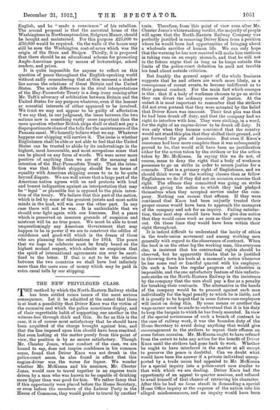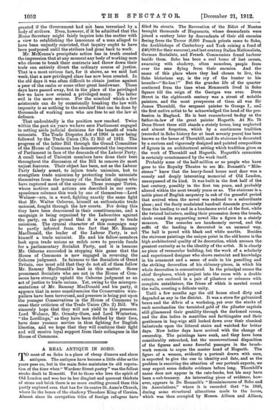THE NEW PRIVILEGED CLASS. T HE method by which the North-Eastern
Railway strike has been settled raises issues of the most serious consequence. Let it be admitted at the outset that there is at least a possibility that Driver Knox was the victim of the excessive zeal which the police sometimes display, and of their regrettable habit of supporting one another in the witness-box through thick and thin. So far as this is the case, it is of course most satisfactory that he should have been acquitted of the charge brought against bim, and that the fine imposed upon him should have been remitted. But even looking at the matter purely from this point of view, the position is by no means satisfactory. Though Mr. Chester Jones, whose conduct of the case, we are bound to say, does not inspire confidence in his common sense, found that Driver Knox was not drunk in the police-court sense, he also found in effect that this engine-driver was the worse for liquor. We wonder whether Mr. McKenna and his nominee, Mr. Chester Jones, would care to travel together in an express train driven by a man who was known to be capable of drinking more liquor than was good for him. We rather fancy that if this opportunity were placed before the Home Secretary, or even before the members of the Labour Party in the House of Commons, they would prefer to travel by another train. Therefore, from-this point of view even after Mr, Chester Jones's whitewashing verdict, the majority of people will agree that the North-Eastern Railway Company was perfectly justified in removing Driver Knox from a position where he would have had opportunities of bringing about a wholesale sacrifice of human life. We can only hope that the warning he has now received will make him cautious in taking rum on an empty stomach, and that he will not in the future argue that as long as he keeps outside the limits of the police-court definition he need not trouble his head about outside criticism.
But frankly the general aspect of the whole business suggests that he and others are much more likely, as a consequence of recent events, to become indifferent as to their general conduct. For the main fact which emerges is this : that if a body of workmen chooses to go on strike they can divert the ordinary course of justice. At the outset it is most important to remember that the strikers did not even pretend that they were actuated by the belief that Driver Knox was innocent. Their first plea was that he had been drunk off duty, and that the company had no right to interfere with him. They were striking, in a word, for the right of an engine-driver to be drunk off duty. It was only when they became convinced that the country would not stand this plea that they shifted their ground, and put forward the plea of innocence. But even if Knox'a innocence had been more complete than it was subsequently proved to be, that would still have been no justification either for the action taken by the strikers or for the action taken by Mr. McKenna. In saying this we do not, of course, mean to deny the right that a body of workmen possesses to go on strike in order to secure justice for a comrade. That is a primary right of Englishmen, and we should think worse of the working classes than as fellow Englishmen we do if they did not on occasion exercise that right. The offence they committed was going on strike without giving the notice to which they had pledged themselves when they accepted service under the com- pany. Nothing can excuse that offence. If they were convinced that Knox had been unjustly treated their proper course would have been to approach the managers of the company and ask for an inquiry. Failing satisfac- tion, their next step should have been to give due notice that they would cease work as soon as their contracts ran out. On these lines they would have been within their right throughout.
It is indeed difficult to understand the laxity of ethics in the trade-union movement and among working men generally with regard to the observance of contract. When the boot is on the other leg the working man, like everyone else, is insistent that his contractual rights should be observed, but he apparently thinks that he is justified in throwing down his tools at a moment's notice whenever he has some real or fanciful quarrel with his employer. On such a basis the regular progress of industries is impossible, and the one satisfactory feature of this unfortu- nate strike on the North-Eastern Railway is the insistence by the company that the men shall pay a fine as a penalty for breaking their contracts. The alternative in the hands of the company would be to proceed against each man individually for the legal penalty to which he is liable, and it is greatly to be hoped that in some future case employers will insist on doing this. By some means or another the wage-earner must be made to understand that it is his duty to keep the bargain to which he has freely assented. In view of the special seriousness of such a breach of contract in the case of railway work, it was the bounden duty of the Home Secretary to avoid doing anything that would give encouragement to the strikers to repeat their offence on some future occasion. Mr. McKenna ought to have refused from the outset to take any action for the benefit of Driver Knox until the strikers had gone back to work. Whether he ought to have interfered in the matter at all except to preserve the peace is doubtful. Can we doubt what would have been the answer if a private individual unsup- ported by a trade union had appealed to Mr. McKenna for a special inquiry into a police-court case similar to that with which we are dealing. Driver Knox had the opportunity of an appeal to quarter sessions, and refused to avail himself of that chance of retrieving his character. After this he had no locus stancli in demanding a special Home Office inquiry at the expense of the nation into his alleged misdemeanours, and no inquiry would have been granted if the Government had not been terrorized by a body of strikers. Even, however, if it be admitted that the Home Secretary might fairly inquire into the matter with a view to establishing the innocence of a man alleged to have been unjustly convicted, that inquiry ought to have been postponed until the strikers had gone back to work. Mr. McKenna's precipitate action has in truth created the impression that at any moment any body of working men who choose to break their contracts and throw down their tools can entirely divert the ordinary course of justice. That is a most serious fact, for it shows, as we said last week, that a new privileged class has now been created. In the old days it was often difficult to obtain justice against a peer of the realm or some other great landowner. Those days have passed away, but in the place of the privileged few we have now created a privileged many. The latter evil is the more serious. For the mischief which a few aristocrats can do by occasionally breaking the law with impunity is as nothing to the mischief that can be done by thousands of working men who are free to set the law at defiance.
That undoubtedly is the position now reached. Twice -within the past six years we have seen Parliament engaged in setting aside judicial decisions for the benefit of trade unionists. The Trade Disputes Act of 190(3 is now being followed by the Trade Union (No. 2) Bill of 1912. The progress of the latter Bill through the Grand Committee of the House of Commons has demonstrated the impotence of Parliament in face of the demands of the Labour Party. A small band of Unionist members have done their best throughout the discussion of the Bill to remove its most unjust features. Their object has been, not as the Labour Party falsely assert, to injure trade unionism, but to strengthen trade unionism by protecting trade unionists themselves from the tyranny of the Socialist cliques who have 'captured most of the unions. These younger Tories, whose motives and actions are described in our corre- spondence columns this week by one of themselves—Lord Wolmer—are, in a word, fighting exactly the same fight that Mr. Walter Osborne, himself an enthusiastic trade unionist, fought through the law courts. For doing this they have been denounced in their constituencies, and a campaign is being organized by the Labourites against the party, on the ground that it is opposed to trade unionism. The cynical character of this campaign may be partly inferred from the fact that Mr. Ramsay MacDonald, the leader of the Labour Party, is not himself a trade unionist. He and his fellow-members look upon trade unions as much cows to provide funds for a parliamentary Socialist Party, and it is because Mr. Osborne succeeded in stopping this game that the House of Commons is now engaged in reversing the Osborne judgment. In fairness to the Socialists of Great Britain, one must add that they do not all of them follow Mr. Ramsay MacDonald's lead in this matter. Some prominent Socialists who are not in the House of Com- mons have strongly upheld the Osborne judgment as an act of justice to trade unions. Yet, owing to the misrepre- sentations of Mr. Ramsay MacDonald and his party, it appears that in some constituencies the Conservative wire- pullers have been terrorized, and pressure is being put upon the younger Conservatives in the House of Commons to cease their criticism of the Trade Union (No. 2) Bill. We sincerely hope that they will not yield to this pressure. Lord Wolmer, Mr. Ormsby-Gore, and Lord Winterton, " the Lordlings," as they have been dubbed by their foes, have done yeoman service in thus fighting for English liberties, and we hope that they will continue their fight and will receive loyal support from their colleagues in the House of Commons.











































 Previous page
Previous page